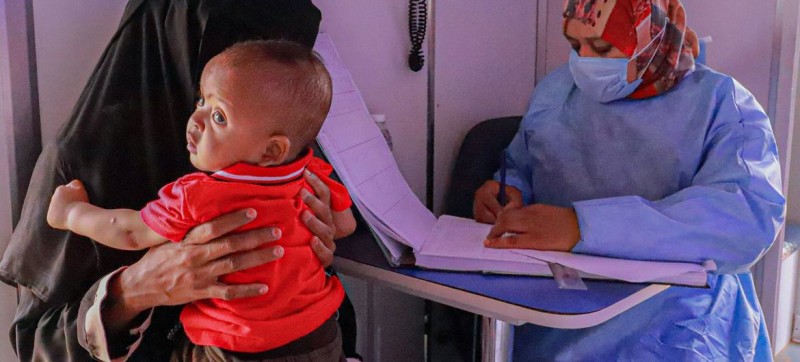- Record-breaking CO₂ surge in 2024 threatens global warming: UN |
- Dhaka stocks tumble as DSEX plunges 80 points |
- July Charter signing to be an occasion of national celebrations: Yunus |
- Passenger bus in northern India catches fire: 20 people burn to death |
- Voting start in Ctg Varsity Central Students Union elections |
UN Envoy Warns Libya’s Transition Stalled by Political Rift

A Sudanese refugee takes her baby for a health check in Alkufra in eastern Libya.
The UN’s top envoy for Libya warned on Tuesday that the country’s long-delayed political transition will remain stalled unless rival institutions swiftly resolve their differences over election laws and key appointments.
Hanna Tetteh, the Special Representative of the Secretary-General, said that while some progress has been made towards implementing a UN-backed political roadmap, divisions between the House of Representatives and the High Council of State continue to block essential steps needed before the long-awaited national elections.
“The two institutions have yet to achieve this objective,” Ms Tetteh told ambassadors in the Security Council.
“They have not yet jointly discussed the constitutional and legal framework for elections. Achieving political consensus on these matters will be challenging … [but] Libya cannot afford continued delays or disruptions.”
The roadmap’s first milestone – reconstituting the full Board of Commissioners of the High National Elections Commission – remains incomplete.
Disagreements persist over whether to replace all seven members or fill only the vacant posts – a debate that Ms Tetteh said reflects “a broader lack of political will.”
She urged Libyan leaders to “engage constructively” to complete the initial milestones, adding that if no agreement is reached, the UN Support Mission in Libya (UNSMIL) will “pursue another approach” and seek the Council’s backing to ensure the roadmap moves forward.
In parallel, UNSMIL is preparing to launch national dialogue sessions in November, aimed at bringing together broader segments of Libyan society – including civil society, youth, and women’s representatives – to help shape an inclusive political process.
The discussions will cover governance, security, the economy, and human rights.
Ms Tetteh also reported a reduction in tensions across the capital, Tripoli, following mediation between the Government of National Unity (GNU) and the Deterrence Apparatus for Combating Organized Crime and Terrorism (DACOT), crediting local actors and Türkiye’s intervention.
“A stable security environment is critical for stability and for political progress,” she said.
On governance, she raised concern about corruption and weak oversight, noting the Central Bank’s discovery of billions of dinars in unregistered currency.
She welcomed Libya’s newly launched national plan to combat corruption, calling it “an important step forward” but one that would require “political will to advance transparency and accountability.”
The top UN official underscored the Libyan people’s desire for legitimate, unified institutions.
“They deserve political stability and long-term peace,” she said. “UNSMIL is committed to supporting them.”

